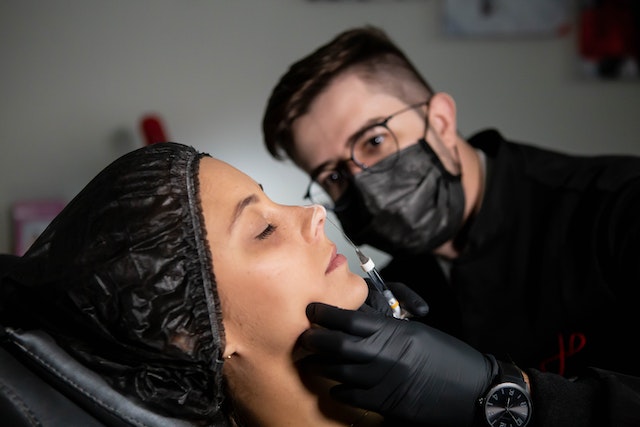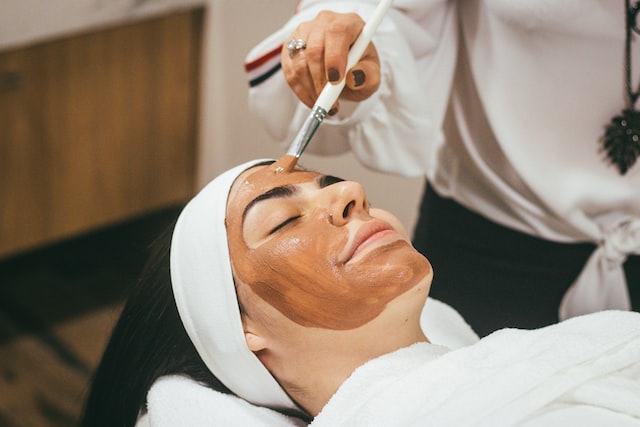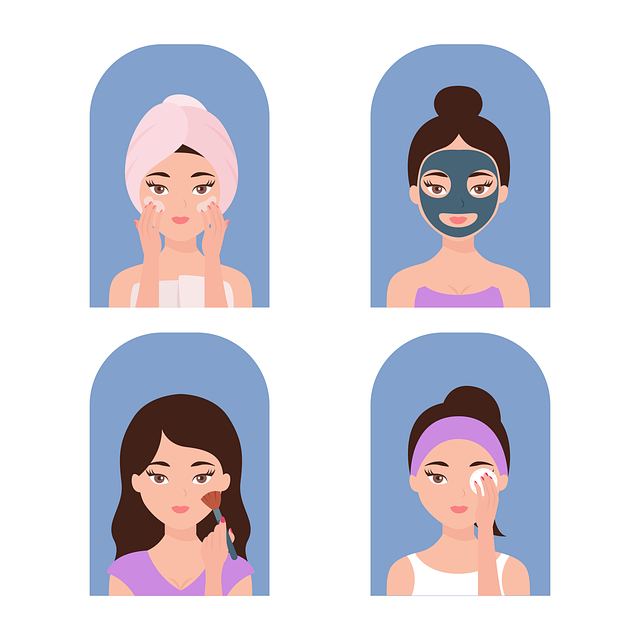A dermatologist is trained in diagnosing and treating medical conditions of the skin while a cosmetologist focuses more on providing beauty services such as hair styling, makeup application, facials, and manicures.
Who is a dermatologist?
(Photo by Lucas Guimarães Bueno)

A dermatologist is a medical doctor who specializes in the diagnosis and treatment of conditions affecting the skin, hair, nails, and mucous membranes. They are trained in both the medical and surgical aspects of dermatology.
Who is a cosmetologist?
(Photo by Raphael Lovaski on Unsplash )

A cosmetologist is a professional who specializes in the care of cosmetic products and their application. They are also experts in the use of make-up, hair styling, and skincare. A cosmetologist may work in a salon, spa, or other beauty setting.
Dermatologists vs. Cosmetologists
Dermatologists and cosmetologists are both professionals who specialize in the care of the skin, but there are some key differences between the two.
A dermatologist is a medical doctor who has completed extensive training in the diagnosis, treatment, and prevention of skin conditions and diseases. They have completed medical school and a residency in dermatology, and may be board-certified in their field. Dermatologists can diagnose and treat a wide range of skin conditions, from acne and eczema to skin cancer and psoriasis. They can also perform surgical procedures like skin biopsies and excisions. In addition, dermatologists are able to prescribe medications to treat skin conditions and can provide patients with advice on how to manage their skin health.
On the other hand, a cosmetologist is a professional who provides non-medical, cosmetic treatments for the skin, hair, and nails. Cosmetologists must complete a state-approved cosmetology program and obtain a license to practice in their state. They may offer services such as facials, haircuts, manicures, and makeup application. While cosmetologists may be knowledgeable about the products they use and may have some understanding of skin care, they do not have the same level of medical training as dermatologists.
One of the key differences between dermatologists and cosmetologists is the scope of their practice. Dermatologists are trained to diagnose and treat medical skin conditions and can offer a broader range of treatments, including prescription medications and surgical procedures. Cosmetologists, on the other hand, focus primarily on cosmetic treatments and may not be able to provide medical advice or treatments for skin conditions that require a medical diagnosis.
Another important difference is the level of regulation and oversight that exists for each profession. Dermatologists are licensed medical professionals who are subject to strict standards of care and are held accountable for their actions by medical boards. Cosmetologists are licensed by the state and must follow certain regulations for hygiene and safety, but they may not be held to the same standards as medical professionals.
When it comes to choosing between a dermatologist and a cosmetologist, it depends on the individual’s needs. If someone has a skin condition that needs medical attention, a dermatologist is the appropriate choice. If someone is looking for cosmetic treatments, a cosmetologist may be able to provide what they need. It’s important to do research and choose a professional who is licensed and has a good reputation.
The Different Services They Offer
Dermatologists and cosmetologists offer different services due to their varying levels of training and expertise.
Dermatologists specialize in the diagnosis and treatment of medical skin conditions. They can offer a range of services to their patients, including medical consultations, prescription medications, and surgical procedures. Some of the common conditions that dermatologists treat include acne, eczema, psoriasis, rosacea, and skin cancer. Dermatologists may also offer cosmetic treatments, such as injectables and laser therapy, but their primary focus is on the medical health of the skin.
Cosmetologists, on the other hand, primarily offer non-medical cosmetic services to their clients. They are trained in a variety of services, including hair styling, makeup application, manicures and pedicures, and facials. Cosmetologists may also offer hair removal services, such as waxing or threading. While some cosmetologists may have some training in skin care, they are not licensed to diagnose or treat medical skin conditions. They may recommend over-the-counter products or offer basic advice on skin care, but they cannot prescribe medication or perform surgical procedures.
It’s important to note that there is some overlap between the services offered by dermatologists and cosmetologists. For example, both may offer chemical peels or laser hair removal. However, the focus and expertise of each profession is different. A dermatologist will use these treatments primarily to address medical conditions, while a cosmetologist will use them to enhance a client’s appearance.
The services offered by dermatologists and cosmetologists are tailored to different needs. If someone is experiencing a skin condition, they should see a dermatologist for medical treatment. If someone is looking for cosmetic services, a cosmetologist may be able to provide what they need. It’s important to choose a licensed and reputable professional for any skin-related service to ensure that the person is getting the appropriate level of care.
The training required to become a dermatologist
To become a dermatologist, an individual must complete a significant amount of education and training.
The first step is to obtain a bachelor’s degree, typically in a pre-med or science-related field. After completing a bachelor’s degree, the individual must then attend medical school, which takes four years to complete. During medical school, the individual will take courses in anatomy, physiology, pharmacology, and other medical topics.
After completing medical school, the individual must then complete a residency in dermatology. Dermatology residencies typically last three years and provide extensive training in the diagnosis and treatment of skin conditions. During the residency, the individual will work in a clinical setting and will be supervised by experienced dermatologists. They will learn to diagnose and treat a wide range of skin conditions, as well as how to perform surgical procedures, such as biopsies and excisions.
After completing their residency, some dermatologists choose to pursue additional training in a specialized area of dermatology, such as pediatric dermatology or dermatopathology. This additional training is typically done through a fellowship program, which can take one to two years to complete.
In addition to completing formal education and training, dermatologists must also obtain a license to practice medicine in their state. They must pass the United States Medical Licensing Examination (USMLE) and complete a certain number of hours of continuing medical education each year to maintain their license.
Becoming a dermatologist requires a significant amount of time, dedication, and hard work. However, for those who are passionate about helping others maintain healthy skin, it can be a rewarding and fulfilling career.
The training required to become a cosmetologist
There is a lot of training required to become a cosmetologist. Most states require that you have at least a high school diploma or GED, and you must complete an accredited cosmetology program. There are two types of accredited programs: traditional and independent. Traditional programs are offered at community colleges and take about two years to complete. Independent programs are offered at private schools and can take anywhere from nine months to two years to complete.
After completing an accredited program, you must then pass the state board exam in order to get your license. Once you have your license, you can start working in a salon. However, many cosmetologists choose to further their education by taking additional courses or becoming certified in a specific area such as hair styling, coloration, or nail care.
What is the difference between a cosmetologist and a beautician?
A cosmetologist is a professional who specializes in the care and beautification of the hair, skin, and nails. A beautician is a person who provides beauty services such as manicures, pedicures, facials, and hair styling.
The main difference between a cosmetologist and a beautician is that cosmetologists are trained and licensed professionals, while beauticians are not. Cosmetologists must complete an accredited cosmetology program and pass a state-licensed exam. Beauticians do not need to be licensed, but some may choose to complete a training program.
Cosmetologists typically have more knowledge about the science of hair, skin, and nails than beauticians. They use this knowledge to provide their clients with the best possible service. Beauticians may also provide good service, but they are not required to have the same level of training as cosmetologists.
What are the benefits of becoming a Cosmetologists
There are many benefits to becoming a cosmetologist. One of the most obvious benefits is that cosmetologists can make a very good living. According to the Bureau of Labor Statistics, the median annual salary for cosmetologists was $23,700 in May 2012. The top 10 percent earned more than $43,030, and the bottom 10 percent earned less than $16,590. In addition to a good salary, cosmetologists often receive tips from clients, which can add substantially to their income.
Another benefit of being a cosmetologist is that it can be an exciting and varied career. Cosmetologists often have the opportunity to meet new people and work with different types of clients on a daily basis. They may also have the opportunity to travel to different locations for work or training. Additionally, many cosmetologists find they enjoy the creative aspects of their job, such as coming up with new hairstyles or makeup looks.
Finally, becoming a cosmetologist can provide individuals with a great deal of personal satisfaction. Many people take pride in helping others look their best and feel more confident about themselves. In some cases,cosmetologists may even develop long-term relationships with their clients.
Featured Image By – Image by riza april from Pixabay









